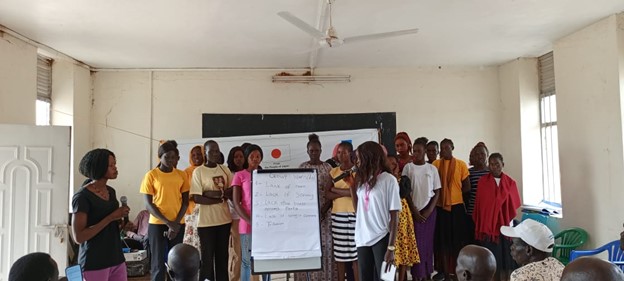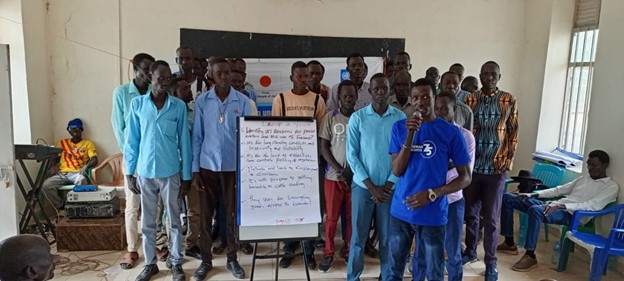Governance, Peaceful Coexistence, and Disarmament of the mind
Japan and UNDP partner to support the training of 150 Women and Men in Upper Nile State
May 6, 2024

Participants in Upper Nile State during the training on their roles and responsibilities in promoting governance and peaceful coexistence
South Sudan has received 656,566 returnees and refugees from Sudan following the conflict started in April 2023. Out of this, 559,732 individuals entered South Sudan through Upper Nile State. This influx has further strained the socio-economic infrastructures and already overstretched resources in the State, contributing to an environment for tensions. According to the International Organization for Migration (IOM) and the Office of the United Nations High Commissioner for Refugees (UNHCR), a considerable population of registered returnees intend to move towards Malakal from Renk in the coming months.
Malakal is also a primary destination for newly arriving returnees and refugees due to the Sudan conflict, with around 25,000 expected to arrive and remain in Malakal. However, the proliferation of small arms and light weapons also poses a threat to peaceful co-existence in Malakal. Further, Upper Nile, is very susceptible to triggers associated with ethnic tension, inequality and mistrust, making it difficult for returnees to heal, and develop the ruins of their home.
To help facilitate the return and integration of returnees and refugees in Malakal, and also ensure a sustainable return, UNDP with support from the Government of Japan on 22-23 March 204 engaged and trained 150 (27 female) men and women in Malakal on their roles and responsibilities in promoting peaceful co-existence, good governance and the disarming of the minds of civilians carrying weapons illegally in the communities.

Japan and UNDP support the training of 150 Women and Men in Upper Nile State
The training equipped representatives from organized forces, youth groups and women groups from Malakal, Balliet and Akoka Counties with knowledge on peaceful co-existence, governance, the South Sudan Voluntary Civilian Disarmament Strategy, Chapter 4 and 10 of the South Sudan Firearms Act 2016, and on the solutions for curtailing the proliferation of small arms and light weapons. Amongst all 150 men and women trained, only two persons had heard about the South Sudan Firearms Act 2016. The training on the South Sudan Firearms Act helped the youth to understand the roles of the South Sudan National Police Services (SSNPS) in prosecuting persons found guilty of possessing illegal firearms.
Chol 24, Thandiet 20, Jak 23 – young men said, ‘The information we learned was new for us. We did not know what the police was supposed to do and what the roles of women and men are in disarmament. We can share this knowledge when we participate in peace dialogues in our communities’

Women’s group presenting on the solutions for mitigating arms proliferation
After the training, the men and women present in the training were equipped with information that to apply for license to possess firearms legally, a person must be 45 years of age, must have gone through a certified medical examination, and must undergo training on the use of firearm.
Nyapanom, a 20-year-old woman, said that she learnt about the dangers of carrying guns are and how it is causing harm and insecurity. Now that she gained the knowledge, she is able to share it at home.
The participants now also understand the places that firearms are not permitted to be carried or displayed and left with the knowledge on the penalty for removing the marking on weapons that belong to the organized forces following theft cases.
Kudo 40 years old man said, 'The training taught me how to disarm and not to diverge from it. Now I can go home and preach what I have learned to the different people in the rural areas’
In addition, the training also highlighted that anyone found possessing illegal firearms will face 5 years of imprisonment, information most participants were not aware of. The training also covered the South Sudan Firearms Act 2016 which is vital to disarming of the minds of communities through awareness on the legal framework for arms control in South Sudan.
‘The benefit to me was that I learned how to raise awareness between communities, how I can explain to them not to use guns’ – Hamisa, 25 years old, young woman

Youth groups presenting on the reasons for the proliferation of firearms
The Chiefs and women and youth groups in the training called on the government of South Sudan to enforce these laws, citing that ‘’they will work towards upholding the legal framework on Firearms’’ as a fundamental tool for disarming the mind. The Minister of Peacebuilding Building in Upper Nile – Hon Jeremiah Deng demonstrated commitment to the training through his attendance and thanked UNDP and Japan for the training. The Minister stated that such training is highly needed, further requesting the youth to inform others about the knowledge they gained from the workshop. The training increased the positive behavioral and attitudinal change towards the negative impacts on the use of illegal firearms, which will foster increased the feelings of safety and influence return of IDPs and refugees.
This activity promoted Goal 16 of the SDGs which seek to promote peaceful and inclusive societies for sustainable development, provide access to justice for all and build effective, accountable and inclusive institutions at all levels. The activity is also complementing South Sudan’s United Nations Sustainable Development Cooperation Framework (UNSDCF) 2023-2025 Outcome 1: Women and men in South Sudan, particularly youth and vulnerable groups, benefit from and participate in more transparent, accountable, and inclusive governance that protects and promotes human rights, enables the consolidation of peace, establishes the rule of law, and ensures access to justice for all.

The South Sudan Bureau for Community. Security & Small Arms Control (BCSSAC) facilitating a session on the South Sudan Voluntary Civilian Disarmament Strategy

 Locations
Locations